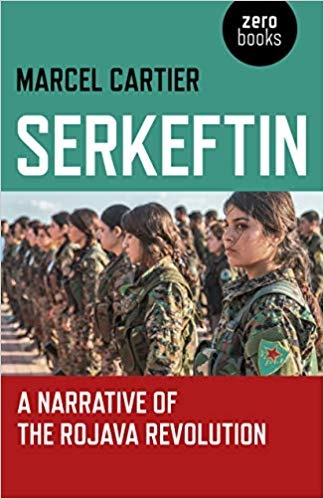This is the last article you can read this month
You can read more article this month
You can read more articles this month
Sorry your limit is up for this month
Reset on:
Please help support the Morning Star by subscribing here
Serkeftin: A Narrative of the Rojava Revolution
by Marcel Cartier
(Zero Books, £10.99)
“SERKEFTIN” in the Kurmanji dialect of Kurdish means “victory” and for this book’s author Marcel Cartier it’s a word describing the direction of travel of the Rojava revolution.
US-born, Cartier now lives in Berlin, where he’s a journalist for Redfish Media and a hip-hop artist. But in spring 2017 he travelled for a month in the predominately Kurdish areas of northern Syria to touch base with the radical grassroots revolution there.
He spoke to commanders of the People’s Protection Units (YPG), visited women’s organisations and saw co-operatives and communes in action. He recounts his interactions and engagement with the numerous debates surrounding the revolution and of particular interest are his discourses on the Women’s Protection Units (YPJ), the women’s struggle in Rojava and the criticism of the link between the YPG and US imperialism.
He outlines the principles of jineologi — the “science of women’s liberation” — ideas encapsulating the freedom of thought and autonomy of women, but he also takes a swipe at the Western mainstream media’s labelling of the revolution as purely a feminist movement.

Cartier describes the historic and pivotal roles of the numerous female martyrs who have contributed to the Kurdish freedom struggle over four decades and explains that at its core the revolution is about the liberation of women “from the shackles of patriarchal degradation that is wrapped up, and inherent, in capitalism.”
Through interviewing comrades in the YPJ, he presents the idea that the women’s movement in Rojava is one that is focused on the “collective liberation of the entirety of the people,” taking the Western liberal conception of “I can go, do and speak what I want,” to another level.
The author provides an interesting insight into the relationship between the Kurdish movement and US imperialism and its purpose, which rebutts accusations in some left quarters that the YPG and YPJ are pawns of the empire. Cartier has elsewhere described this as a “tactical, temporary military relationship,” which is multi-dimensional and, inevitably, one of contradictions.
The book begins and ends by commemorating the late Mehmet Aksoy, the soldier and film-maker who fell as a shehid (martyr) in 2017. Cartier recounts how he felt when he lost his comrade and friend: “At a time like this, words seem feeble, seem rigid, seem even cold though they’re written with the warmest sentiments and with the best of intentions.”
It’s a particularly resonant comment, reflecting not only on the loss of a friend but also on the essence of the Rojava revolution.
In the midst of the battleground, death is the inevitable sacrifice but the ultimate trade in pursuit of a righteous cause.








